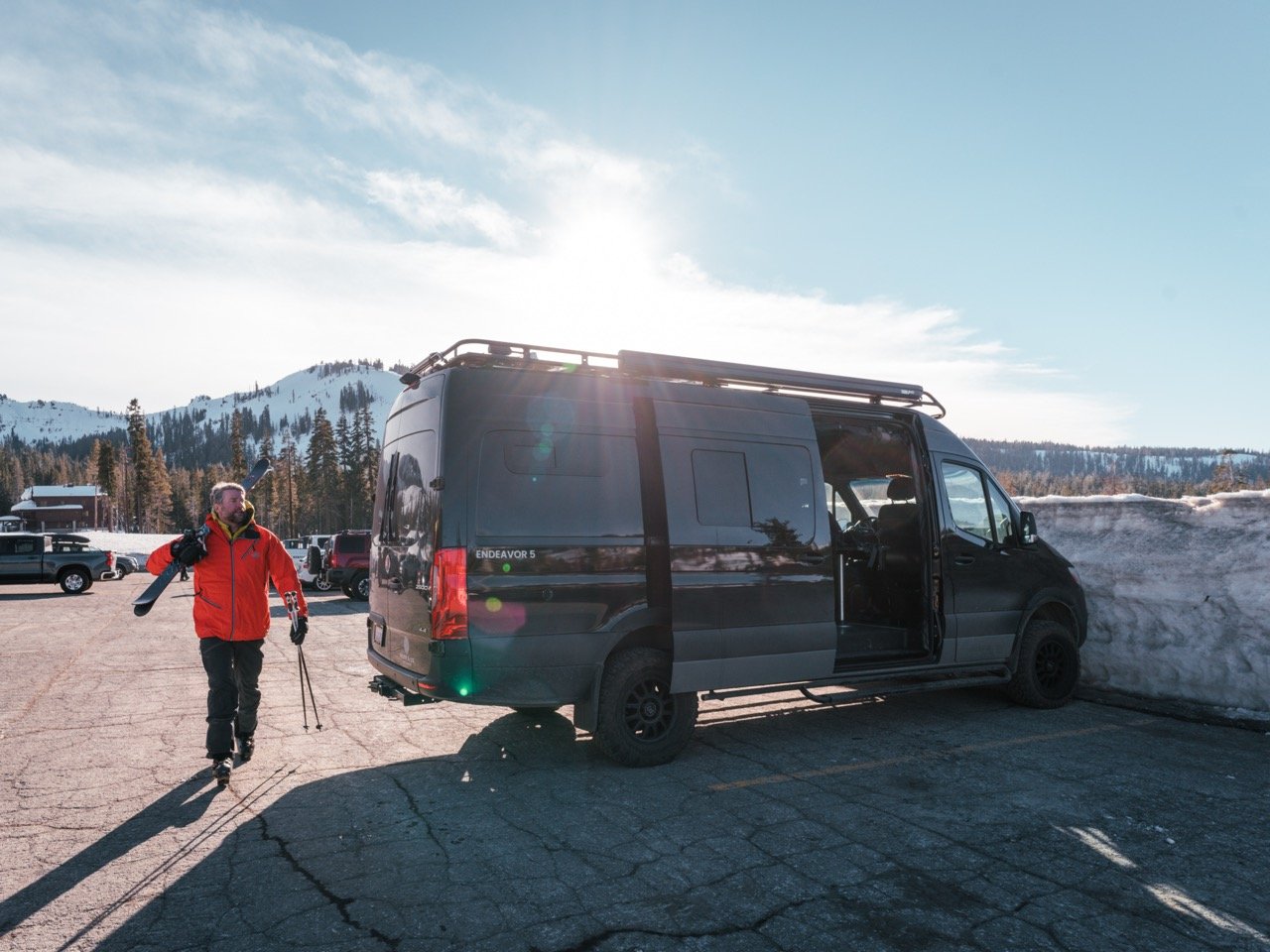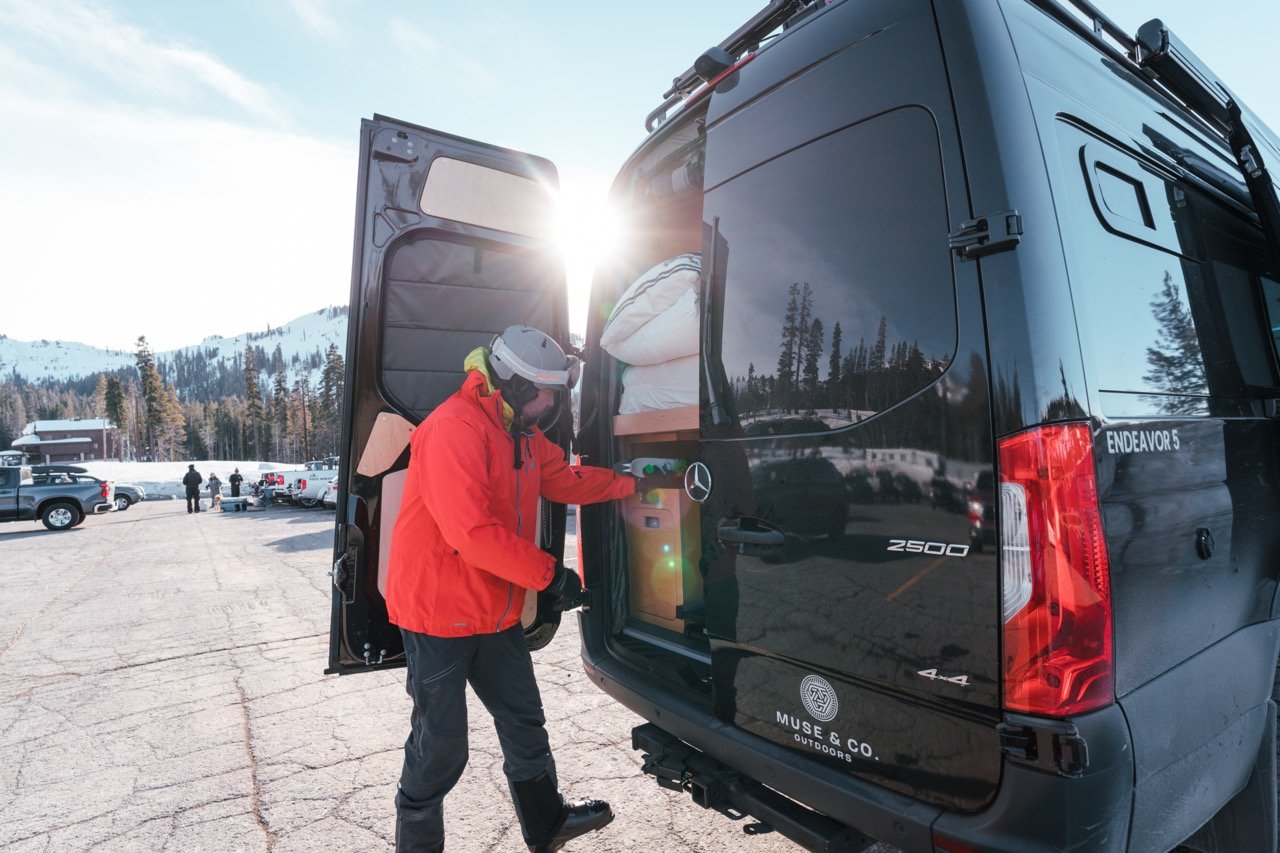Campervan Heating Options: Best Heaters for Van Life

Photo credit: Muse & Co. Outdoors
Camper van conversions are surging in popularity because they provide so many comforts of home in a small space that you can take off-grid and on long road trips.
One component that really adds to the luxury of camping in a van is a heater. There’s nothing like relaxing inside of a warm van when the weather outside is cold and blustery.
Like most camper van components, there are several options when it comes to what type of heater you should buy.
The best heaters for van builds have built-in safety features, work seamlessly in different conditions, and provide thermostat-controlled, on-demand heat.
Keep reading to learn about the different types of heating systems available for use in camper vans, including which van life heat sources are best and why.
Electric Heaters for Campervans
Most components in a camper van can be run off of a 12v electrical supply. A van’s fridge, lights, fan, and more all run off of its batteries, which are usually charged by solar.
When it comes to heating up your van, though, electric heaters are not common.
Electric space heaters and ceramic heaters run off of 110-volt AC power. Although most campervans come equipped with an inverter capable of powering small AC appliances, the power draw of electric heaters is too high to make them usable in camper van electrical systems.
Still, carrying a small electric space heater is not a bad idea if you plan on spending a lot of time at campsites with electrical hook-ups. Just make sure to get one that has an automatic tip-over shut-off mechanism, which can help prevent fires.
For those camping off-grid in their conversion vans, electric heaters won’t do the trick. Thankfully, there are some other great options to provide hot air while on the road.

Photo Credit: Muse & Co. Outdoors
Propane Heaters for Campervans
Propane heaters are one of the most common solutions for camper van owners who need heat output in their rigs.
Portable Propane Heaters
A quick search for propane heaters will yield many results, including the popular portable heaters called Mr. Buddy.
Although portable propane heaters like the Mr. Buddy provide an ample amount of heat, are cheap, and can easily be hooked up to a large propane tank instead of small propane canisters, they are not a great solution for van life.
These heaters are not meant for prolonged indoor use because they emit carbon monoxide and water as byproducts. The result for camper van use? Potential CO poisoning and lots of condensation build-up inside of your van. Not ideal!
Externally Vented Propane Heaters
To avoid the problems posed by portable propane heaters, a propane heater must have intake and exhaust ducting to the outside of the van.
Propane heaters that draw in fresh air to heat from outside and push out the exhaust air will not lead to CO or condensation build-up inside of the van.
These heaters provide “dry heat”, meaning that they expel the excess moisture produced during propane combustion, heating the van without leading to condensation.
Propane heaters require a propane tank that is safely mounted somewhere inside or outside of the van, as well as the correct propane regulator.
Popular models for propane heaters that provide dry heat in camper vans include the Propex HS2000 and HS2800, and the Suburban RP-16.
These heaters can be complicated to install and it is recommended to have a professional take on the job.
Diesel Heaters & Gas Heaters for Campervans (Espar & Webasto)
For full-time van dwellers and those who travel frequently in cold climates, a heater needs to provide warm air reliably and be able to quickly heat up a Sprinter van.
Fortunately, a perfect solution exists in the form of compact heaters that tap into your van’s fuel tank to provide reliable heat without worries about running out of fuel.
Air heaters like the Eberspacher Espar D2 and the Webasto Air Top 2000 use your van’s gas or diesel tank as their fuel source.
Similar to externally vented propane heaters, these heaters provide safe, dry heat by venting to the outside of the van.
Diesel and gas heaters are difficult to install and more expensive up front, making them less popular for DIY van builders.
Professional builders, however will have no problem installing these heaters. Although the initial cost is a bit higher, they are the most efficient of all campervan heaters and the cheapest to run.
The following are some alternative heating options for van life:
- Hot water bottles: For people living van life on a budget or those who rarely find themselves in cold climates, the old ‘hot water bottle in the sleeping bag’ is a fool-proof method of staying warm on particularly cold nights.
- 12V rechargeable electric blankets: The improvement of battery technology has allowed some companies to start producing electric blankets with their own rechargeable battery packs. These might provide a good alternative for van dwellers looking to stay cozy at night on a budget.
- Wood burning stove: Wood burning stoves might be less practical than air heaters, but it’s hard to argue with the coziness factor. Some companies produce truly miniature wood-burning stoves for tiny home, boat, or camper van applications! Just be sure to keep flammable items away from these units.
Campervans With Heaters for Sale
Are you looking for a professionally built camper van with a heater and other luxury amenities? Muse & Co. Outdoors is a craftsman camper van conversion company based in Oakland, California.
All Muse & Co. Outdoors vans come equipped with an Espar D2 heater which taps into your Sprinter van’s fuel tank to provide reliable heat wherever you travel!
Our vans are built with the highest attention to detail using top-of-the-line, eco-friendly materials.
Use our Build My Van tool to explore your options for customization and learn more about our vans.
